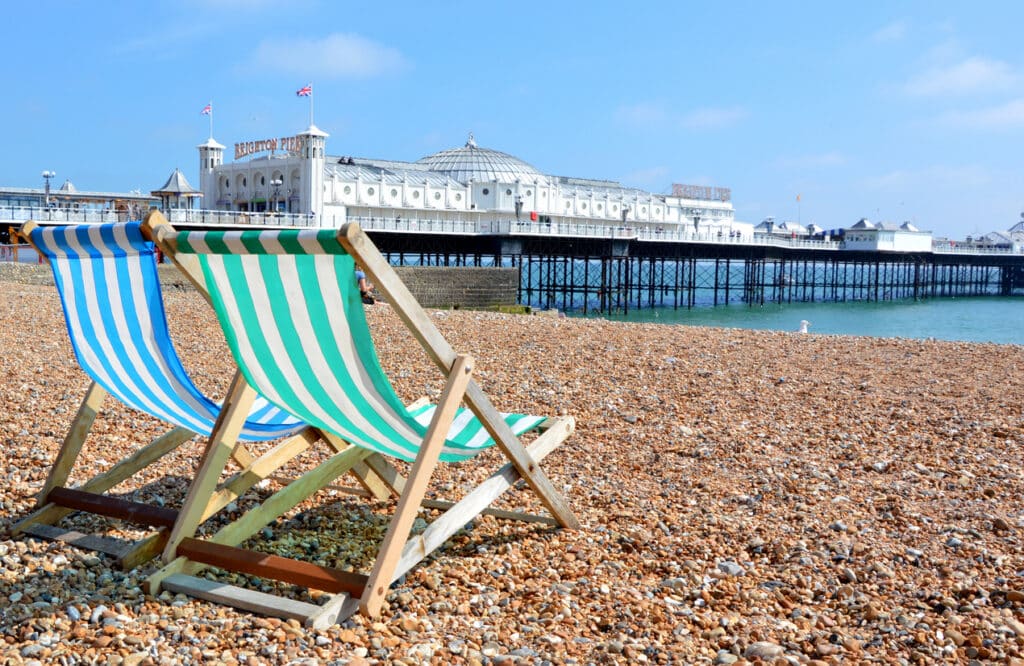Thinking of swapping Florida sunshine for English gardens and endless cups of tea? You’re not alone. More Americans are weighing what it takes to retire in the UK, tempted by world-class healthcare, a gentler pace, and finally getting to say “cheers” unironically.
Post-Brexit, it’s no longer as simple as showing up with a suitcase and a Social Security check—visas and paperwork are part of the deal. But with a high quality of life, reliable NHS care, and a countryside that begs for long walks, the UK remains a favorite for adventurous retirees.
Ready to trade Medicare for the NHS? Here’s what you need to know before making your great British escape.
📋 Key Updates for 2025
- State Pension up by 4.1%, raising the full new State Pension to about £11,973 per year from April.
- The UK government reinstated the Winter Fuel Payment for pensioners with annual incomes of £35,000 or less, covering about 9 million households.
- Inheritance Tax thresholds frozen until 2028 (main nil-rate at £325,000, rising to £500,000 with residence band)—and pensions will count toward estates from 2026/27.
Residency and visa programs: How Americans can legally stay
Dreaming of retiring in the United Kingdom? Unlike some destinations, Britain doesn’t offer a classic “retirement visa”—but that hasn’t stopped determined Americans from finding a path to long-term residency. Whether you have family ties, British ancestry, or investment ambitions, there’s (usually) a way in.
Here are the most common visa routes Americans use to stay in the UK after retirement:
- Family visa: Perfect for those with a British spouse, civil partner, or qualifying family already living in the UK. You’ll need to prove your relationship and meet income or savings requirements.
- Ancestry visa: If you have a grandparent born in the UK, you could qualify—even in retirement—provided you’re a citizen of a Commonwealth country and plan to work, even part time, upon arrival.
- Innovator visas: Not designed for retirees per se, but open to those with a scalable business idea and business plan. This option often appeals to entrepreneurs or those ready for a second-act career.
- Other residence permits: Work, study, or special visas sometimes fit unique situations, but aren’t typical retirement routes.
A few things to keep in mind:
- Income requirements: Most visas require proof of income, savings, or pension—make sure you have documentation in order.
- Age considerations: While there’s no official “retirement age” for UK visas, eligibility often syncs with state pension age and financial independence.
- Application process: Steps, fees, and paperwork can change frequently—always check the latest guidance at gov.uk for up-to-date info.
- Permanent settlement: Many temporary visas can lead to Indefinite Leave to Remain (ILR), which means you can stay as long as you like—and may even apply for citizenship down the line.
💡 Pro Tip:
Visa planning is the hardest part of retiring abroad. Start early, ask plenty of questions, and don’t hesitate to consult an immigration expert—future-you (sipping tea in a cozy cottage) will thank you.
Cost of living and property prices: What retirees should expect
Settling down in the UK means crunching the numbers—and it’s not just about the price of tea or scones. Housing costs, utilities, and everyday living expenses vary wildly depending on where you land, so planning ahead is key for a comfortable retirement.
Property prices—buyers vs. renters
- In London, property prices are famously steep—think £500,000+ for a small flat or £1,800–£2,500/month to rent.
- Smaller cities (Manchester, Liverpool, Edinburgh) offer flats for £250,000–£350,000, or £800–£1,200/month to rent.
- Rural and seaside areas (Devon, Dorset, Northumberland) are far more affordable, with charming cottages starting around £180,000–£250,000 to buy or £600–£900/month to rent.
Monthly living expenses
- Utilities: £150–£300/month for gas, electricity, and water; higher in winter.
- Council tax: £100–£250/month, depending on property value and location.
- Public transport: £70–£150/month for unlimited bus or train travel in most cities. Car owners should budget extra for insurance, fuel, and parking.
Regional differences
- UNESCO sites (like Bath or Edinburgh) and picturesque towns (St. Andrews, Stratford-upon-Avon) attract expats for their charm, history, and walkability—but also come with higher price tags.
- Affordable regions include parts of Wales, the Scottish Highlands, and northern England, where your pension stretches much further and the pace is slower.
Sample pensioner budgets
- London: £2,800–£3,500/month for a modest, urban retirement.
- Devon or Dorset: £1,800–£2,400/month for a quieter, coastal life.
- Scotland (outside Edinburgh/Glasgow): £1,500–£2,200/month is often plenty for a comfortable village or small-town lifestyle.
💡 Pro Tip:
Set your sights beyond the big cities—many of the UK’s most rewarding (and affordable) retirement destinations are in the countryside or by the sea, where your budget goes further and the pace of life is pure bliss.
Healthcare system: The NHS and private health insurance
Healthcare services are one of the UK’s biggest draws for retiring Americans—no more juggling Medicare plans or dreading surprise hospital bills. As a legal resident, you’ll have access to the National Health Service (NHS), which covers everything from GP visits to hospital care, emergency treatment, and most specialist referrals.
Registering and what’s covered
- Register with a GP (general practitioner) as soon as you arrive—this is your gateway to all NHS services.
- The NHS provides free healthcare at the point of use, including doctor visits, hospital care, most prescriptions (with a nominal fee), and essential treatments.
Immigration health surcharge and eligibility
- Most retirees will pay the immigration health surcharge as part of their visa application, which grants access to NHS services just like a UK citizen.
- Some visas and residency statuses come with immediate eligibility; others may require a waiting period, so always check the latest on gov.uk.
Private health insurance
- While the NHS covers nearly all routine and emergency care, many expats (especially from the U.S.) choose private health insurance for faster specialist appointments, private hospital rooms, or access to treatments not available on the NHS.
- Private insurance can supplement, but isn’t required—think of it as an extra layer for those who want additional comfort or speed.
💡 Pro Tip:
Register with a GP early, keep your NHS number handy, and only consider private insurance if you want extra perks—most expats find the NHS is more than enough for everyday healthcare needs in retirement.
Pensions and retirement income: Maximizing your finances
Sorting out your finances is key to a smooth retirement in the UK—especially when your income crosses borders. Here’s what to keep in mind:
Claiming U.S. social security
You can receive U.S. Social Security payments while living in the UK. Payments are typically direct-deposited in pounds, but exchange rates and fees can affect your monthly income.
UK pension transfers and state pension
- If you’ve worked in the UK, you may qualify for the UK state pension, with eligibility based on your National Insurance record and state pension age (currently 66, rising to 67).
- Transferring a U.S. 401(k) or IRA to a UK pension isn’t straightforward and can come with tax headaches—always seek advice before moving money internationally.
- Private and personal pension schemes in the UK offer more flexibility, but watch for management fees and currency risks.
Double taxation and income tax
- The U.S.–UK tax treaty helps prevent being taxed twice on the same retirement income, but you’ll need to file in both countries.
- UK residents pay income tax on pensions above the annual allowance, while U.S. citizens must keep up with IRS filings.
- Consider professional advice to minimize taxes and reporting errors.
The 4% rule—UK edition
The classic “4% rule” for retirement withdrawals can be a helpful guide, but differences in UK investment products, taxes, and inflation mean you’ll want to tailor your approach to local conditions.
💡 Pro Tip:
Don’t go it alone. Cross-border retirement income can get complicated fast, so talk to a financial planner or tax advisor who understands both U.S. and UK systems. Your future self (and your wallet) will thank you.
Taxes for U.S. retirees in the UK
Retiring in the UK means learning the ropes of both British and American tax systems—especially since you’ll likely have retirement income coming from more than one country. Here’s what to expect:
As a UK resident, you’ll pay British income tax on U.S. Social Security, pensions, and investment income above your personal allowance. Your tax rate depends on your total income and current UK tax bands, and remember—the UK tax year runs from April 6 to April 5, while the U.S. tax filing deadline is April 15.
The U.S.–UK tax treaty
- The treaty generally ensures you don’t pay tax twice on the same income.
- You’re still required to file a U.S. tax return each year, reporting all global income—including UK pensions.
- Foreign tax credits let you offset U.S. taxes with what you’ve already paid in the UK.
- Some pension income (like Roth IRAs or certain annuities) can be treated differently under the treaty—check specifics before you file.
To stay compliant and avoid fines
- File U.S. returns by April 15 (with an automatic extension for expats to June 15); UK returns are due October 31 (paper) or January 31 (online).
- Use gov.uk and IRS.gov for official updates and forms.
- Keep all paperwork, including private pension statements and foreign tax credits, organized and ready for both systems.
💡 Pro Tip:
Coordinate your withdrawals and pension income with both UK and U.S. tax years in mind—timing can impact your tax bracket, reduce double taxation, and even affect your eligibility for tax credits.
Best places to retire: Urban vs. rural areas
Choosing where to retire in the UK is about more than just the scenery—property prices, access to healthcare, transport, and local culture all come into play. Whether you’re drawn to city lights or rolling hills, there’s a spot that’s right for you.
Urban favorites
- London: World-class culture, endless dining, and plenty to do—but at a premium. Property prices and everyday costs are highest here, but so are healthcare options and public transport links.
- Edinburgh, Glasgow, Cardiff: Major cities in Scotland and Wales with vibrant arts scenes, great food, and lower living costs than London. Excellent hospitals and walkable city centers make them popular with retirees.
Rural and coastal gems
- Devon, Dorset, Cornwall: South West England’s coastline is famous for mild weather, friendly villages, and seaside charm. Property prices can be surprisingly affordable—though some hotspots have seen prices rise.
- The Cotswolds: Picture-perfect countryside, historic villages, and easy access to both London and the Midlands.
- Scottish Highlands, North Wales: Tranquil living, dramatic landscapes, and bargain property—just be prepared for fewer amenities and longer drives to the nearest hospital or train.
When choosing your retirement location, think about what matters most: Do you want walkable city life with theatre and museums on your doorstep? Or would you trade some convenience for peace, lower costs, and wide-open views?
💡 Pro Tip:
If you can, visit in every season before you decide. The UK’s charm shifts with the weather, and a quiet winter in the countryside feels very different from a busy summer on the coast!
Retirement lifestyle: What to expect as an American expat
Retiring in the UK isn’t just about paperwork—it’s about finding your rhythm in a new culture, building connections, and making the most of British life (yes, even the weather). Here’s what day-to-day living really looks like for American expats:
Getting around
Public transport is excellent in most cities and towns—think buses, trains, and even ferries in coastal regions. If you settle rurally, you might need a car, but in urban centers, many retirees ditch driving altogether.
Healthcare and services
Registering with a GP is your first step for healthcare. Most communities have plenty of NHS options, but private clinics and pharmacies fill in any gaps. If you have ongoing prescriptions, transfer records before you move.
Community and social life
- Many retirees join local clubs—everything from walking groups to book clubs to gardening societies.
- Volunteering is big in the UK, whether at libraries, schools, or local charities—it’s a great way to meet people and settle in.
- Expat groups, Americans-in-Britain clubs, and “U3A” (University of the Third Age) chapters make it easy to find your tribe.
Post-Brexit updates
Rules have shifted for pensioners and expats: visas are stricter, and certain travel freedoms aren’t as automatic. Still, the expat community remains strong, and most day-to-day life is unchanged for retirees once you’re settled.
💡 Pro Tip:
Embrace British quirks—chat with your neighbors, learn the bus schedule, and never say no to a cup of tea. The more you get involved locally, the more “at home” you’ll feel.
Alternatives to the UK: Weighing your options
The UK is a top pick, but it’s not the only European destination on American retirees’ radar. France, Spain, and Portugal all offer sunshine, great food, and friendly visa options—but with their own quirks.
France
- Pros: World-class healthcare, vibrant culture, and charming countryside.
- Cons: Higher property prices in Paris and the Riviera, plus a famously complex bureaucracy and strict tax rules for foreigners.
Spain
- Pros: Warm climate, affordable property (especially outside big cities), and excellent public healthcare.
- Cons: Slower paperwork, language barrier for some, and changing rules for non-EU retirees post-Brexit.
Portugal
- Pros: Friendly visa programs for retirees, lower cost of living, great beaches, and tax incentives (like the Non-Habitual Resident regime).
- Cons: Rural healthcare can be limited, and real estate in Lisbon/Porto has spiked.
UK vs. the rest
The UK boasts top-tier healthcare, no language barrier, and strong expat networks, but property prices and cost of living are often higher—especially in London and the South East. In southern Europe, you might trade some rain for more red tape, but your pension could stretch a lot further.
💡 Pro Tip:
Visit your top choices for an extended stay before deciding—there’s no substitute for living like a local, even if it’s just for a month or two.
Ready to start your UK retirement adventure?
Retiring in the UK means top-notch healthcare, village strolls, and—yes—maybe even a new appreciation for drizzle. With the right retirement planning, you can skip the stress over visas, property, and taxes, and get straight to enjoying your next chapter.
Worried about cross-border taxes spoiling your British dream?
Let Bright!Tax handle the paperwork while you hunt for the perfect cottage (or just your new favorite pub). Reach out today—your stress-free UK retirement starts here!
Frequently Asked Questions
-
Can I retire in the UK as a U.S. citizen?
Yes, but there’s no official “retirement visa.” Most Americans retire in the UK by qualifying for a family visa, ancestry visa, or investor visa, or by extending other residency permits.
-
How much money do I need to retire in the UK?
It depends on your lifestyle and location. In London, a comfortable retirement might require £3,000+ per month; in rural areas or smaller cities, £1,800–£2,400 could be plenty. Always budget extra for healthcare, council tax, and travel.
-
Will I have access to the NHS as a retiree?
Yes, if you’re a legal resident and have paid the immigration health surcharge, you’ll have access to NHS healthcare—just like a local.
-
Can I receive U.S. Social Security in the UK?
Absolutely! U.S. Social Security benefits can be paid directly into your UK bank account (in pounds), though currency conversion rates and bank fees may apply.
-
Do I have to pay taxes in both the U.S. and UK?
Yes, but the U.S.–UK tax treaty generally prevents double taxation. You’ll still need to file in both countries, so it’s wise to work with a cross-border tax expert.
-
What are the best places to retire in the UK?
Popular spots include Devon, Dorset, Cornwall, the Cotswolds, Scotland’s cities, and Welsh coastal towns—each offers its own mix of culture, scenery, and price points.
-
Is it better to buy or rent property as a retiree?
Both are common. Renting offers flexibility, while buying can be a good investment if you plan to stay long-term. Weigh property prices, local taxes, and your long-term plans.
-
Will Brexit affect my retirement?
Post-Brexit rules are stricter for new arrivals, but once you’re legally settled, day-to-day life for retirees hasn’t changed much—just be sure to keep up with visa requirements.
-
Can I bring my spouse or partner with me?
Yes, you can usually include your spouse or partner on your visa application, provided you meet relationship and income criteria.
-
How do I meet people and build a community in the UK?
Join local clubs, expat groups, volunteer, and get to know your neighbors—British communities are welcoming once you make the first move (and offer to make a cup of tea!).

 Connect on LinkedIn
Connect on LinkedIn

